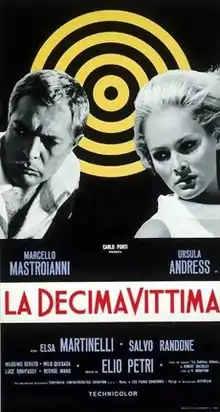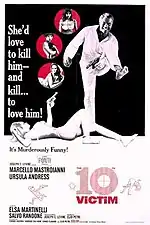The 10th Victim
The 10th Victim (Italian: La decima vittima) is a 1965 Italian international co-production science fiction film directed by Elio Petri and starring Marcello Mastroianni and Ursula Andress, and featuring Elsa Martinelli in a supporting role. The picture is based on Robert Sheckley's 1953 short story "Seventh Victim". It depicts a government-endorsed, televised Big Hunt, featuring contestants from around the world acting as "hunters" and "victims"; when Marcello Poletti and Caroline Meredith, the game's two top assassins, are pitted against each other, they find that love is the most dangerous game of all.
| The 10th Victim | |
|---|---|
 Italian film poster | |
| La Decima vittima | |
| Directed by | Elio Petri |
| Produced by | Carlo Ponti[1] |
| Screenplay by |
|
| Based on | "Seventh Victim" by Robert Sheckley[1] |
| Starring | |
| Narrated by | Jacques Herlin |
| Music by | Piero Piccioni[1] |
| Cinematography | Gianni Di Venanzo[1] |
| Edited by | Ruggero Mastroianni[1] |
Production companies |
|
| Distributed by | Interfilm[2] |
Release date | 3 December 1965[3] |
Running time | 92 minutes |
| Country |
|
| Language | Italian English[4] |

Sheckley later published a novelization of the film in 1966,[5] and two sequels (Victim Prime and Hunter/Victim) in 1987 and 1988, respectively.[6] In the United States, the film was theatrically released by Joseph E. Levine's Embassy Pictures.[7]
Plot
In the near future, big wars are avoided by giving individuals with violent tendencies a chance to kill in the "Big Hunt". The Hunt is the most popular form of entertainment in the world and also attracts participants who are looking for fame and fortune.
It includes ten rounds for each competitor, five as the hunters and five as the victims. The survivor of ten rounds becomes extremely wealthy and retires. Scenes switch between the pursuit, romance between a hunter and a victim, with a narrator explaining the rules and justification of the Hunt.
Caroline Meredith (Ursula Andress) is a huntress armed with a high caliber Bosch shotgun, who has just killed a ninth victim and is looking for her tenth. To maximize financial gain, Meredith wants to get a perfect kill in front of the cameras as she has negotiated a major sponsorship from the Ming Tea Company.
Marcello Poletti (Marcello Mastroianni) is the victim. His winnings from six kills have already been spent by his mistress, Olga (Elsa Martinelli), and his ex-wife, Lidia.
Caroline goes to Rome and impersonates a reporter whose assignment is to study the sexual preoccupations of Italian men. She requests an interview with Marcello at the Temple of Venus.
Suspicious, Marcello arranges for Caroline to be eaten by a crocodile before the cameras of a competing television company, but she escapes.
Caroline lures Marcello to the beach and convinces him that she is in love with him. She drugs Marcello and hauls him back to the Temple of Venus.
Caroline shoots Marcello in front of the television cameras, but Marcello survives because he has loaded the gun with blanks. He then shoots her but she is saved by her bulletproof armor plate.
Marcello and Caroline decide to escape from the Big Hunt and go on a plane, where they decide to get married. The movie ends with the pilot shooting flowers to the two.
Differences from the original story
The original short story was written from the point of view of a man hunting his seventh target, a woman, whereas in the movie she is the hunter. He finds her apparently defenceless sitting in a cafe. Talking to her, she tells him how she is new to the game but could not bear to kill her own target, and now expects to die. The hunter falls in love with his victim, as in the movie, and eventually reveals who he is. She has tricked him; she shoots him, joining the ranks of the "Tens".
The story was adapted for radio on X Minus One in 1957.[8]
Cast
- Marcello Mastroianni – Marcello Polletti
- Ursula Andress – Caroline Meredith
- Elsa Martinelli – Olga
- Salvo Randone – Professor
- Massimo Serato – Lawyer
- Milo Quesada – Rudi
- Luce Bonifazi (as Luce Bonifassy) – Lidia Poletti
- George Wang – Chinese Hunter
- Evi Rigano – Victim
- Walter Williams – Martin
- Richard Armstrong – Cole
- Anita Sanders – Relaxatorium Hostess
- Mickey Knox – Chet
- Jacques Herlin – Masoch Club Owner
- Wolfgang Hillinger – Baron Von Aschenberg
Source:[2]
Reception
On review aggregator Rotten Tomatoes, the film holds a score of 80% based on 10 reviews, with an average rating of 7.35/10.[9] In contemporary reviews, the Monthly Film Bulletin praised the visuals of the film, but stated that "the film is never quite as much fun as it should be, possibly because of rather ponderous dubbing and possibly because imaginative camera angles cannot totally make up for lapses in narrative."[1] Bosley Crowther of The New York Times noted a "wildly imaginative plot" but declared the film overall to be "a clever but patently self-conscious exercise ... The cleverness is so insistent that it soon becomes excessive and absurd, and the gamesmanship of the satire becomes too cute, too much a bore."[10] Variety found the film superior to Jean-Luc Godard's Alphaville, praising both Mastroianni and Andress, as well as Elsa Martinelli and Massimo Serato.[11] The review also noted the cinematography of Gianni di Venanzo.[11] Richard L. Coe of The Washington Post wrote that the film is "not handled so crisply as the material promises", finding that director Elio Petri "did not find quite the exact, cohesive tone such material demands. The result is curiously pedestrian."[12] Algis Budrys of Galaxy Science Fiction described Sheckley's novelization as "a reasonably good chase novel" which would, nonetheless, disappoint readers, whether they wanted a literary version of the film's Italian satire and symbolism or the 'chilling futurama of legalized manslaughter' the cover promised.[13]
In popular culture

The movie is an international cult classic whose wild action and sexy style has influenced a generation of movies, from The Running Man to the Austin Powers series. It was also the first movie to features the reality TV death game theme, which was later used in other works such as Battle Royale, Series 7: The Contenders, and The Hunger Games.[14]
In the early 1990s, comedian and actor Mike Myers, along with musicians Susanna Hoffs and Matthew Sweet, started a faux British 1960s band whose members adopted personas from that era. The band named itself Ming Tea, after the company that sponsored Andress' character in the film.
See also
References
Footnotes
- P.J.S. (1968). "Decima vittima, La (The 10th Victim), Italy/France, 1965". Monthly Film Bulletin. Vol. 35 no. 408. British Film Institute. p. 4. ISSN 0027-0407.
- "La decima vittima (1965)". Archivio del Cinema Italiano On-Line.
- La Stampa, Nov 27, 1965
- "Cinema Club La Decima vittima". RAI.
- Di Filippo, Paul. "The 10th Victim". Science Fiction Weekly. Archived from the original on November 15, 2007. Retrieved 2007-01-06.
- Frelik, Paweł; Mead, David G. (2007). Playing the Universe: Games and Gaming in Science Fiction. Maria Curie-Skłodowska University Press. p. 134. ISBN 978-83-227-2656-3.
- Bosley Crowther. "Screen: Mastroianni vs. Miss Andress:Futuristic '10th Victim' Opens at 2 Theaters". The New York Times.
- "ON RADIO". New York Times. Mar 6, 1957. ProQuest 114061707.
- "The 10th Victim (La Decima vittima) (The Tenth Victim)". Rotten Tomatoes. Retrieved August 1, 2019.
- Crowther, Bosley (December 21, 1965). "Screen: Mastroianni vs. Miss Andress". The New York Times: 46.
- Willis 1985, p. 194-195: "Review is of 92 minute version reviewed on December 15, 1965"
- Coe, Richard L. (December 22, 1965). "'Tenth Victim' At the Embassy". The Washington Post: B10.
- Budrys, Algis (June 1966). "Galaxy Bookshelf". Galaxy Science Fiction. pp. 141–152.
- Ricky (November 16, 2013). "Essential Viewing for Fans of 'The Hunger Games': Part One". PopOptic. Retrieved May 16, 2016.
Sources
- Willis, Donald, ed. (1985). Variety's Complete Science Fiction Reviews. Garland Publishing Inc. ISBN 978-0-8240-6263-7.
Further reading
- Heldman, Caroline; Frankel, Laura Lazarus; Holmes, Jennifer (April–June 2016). ""Hot, black leather, whip" The (de)evolution of female protagonists in action cinema, 1960–2014". Sexualization, Media, and Society. 2 (2): 237462381562778. doi:10.1177/2374623815627789. Pdf.